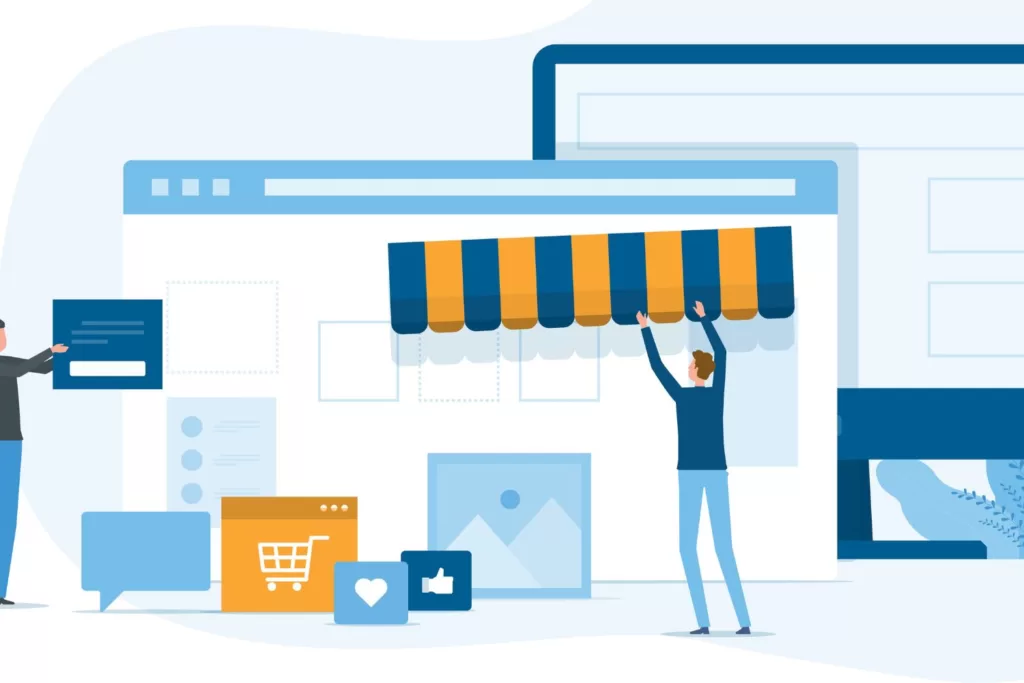Have you ever been online shopping, and the payment process required you to create an account before purchasing? Or, have you ever compared two similar products, and the descriptions weren’t clear enough on the differences?
Whether it’s a lack of guests and one-click checkouts to confusing product offerings, these are signs of poor user experience on an e-commerce website. This is one of many site design issues that can turn potential customers away and buy a similar product from your competitor.
So, how do you know which e-commerce platform is best? Here’s how to pick the right one including, features, recommended website builders, and tips to consider before buying.
What Makes a Good E-Commerce Platform?

Website development can be complex, especially if you don’t know how to build a website and what the process looks like. Even if you’re not tech-savvy, website builders are designed to be user-friendly for anyone to make one on their own.
However, this is just a starting point. It’s up to you to customize your online store’s brand and ensure it pushes products at the forefront of what your target audience wants.
Here are a few features to look for in an e-commerce platform and why they come in handy during the development process:
Budget
While budget may seem obvious, e-commerce platforms have varying prices and add-on costs depending on the package you purchase. Create a list of must-have and nice-to-have features for launch, and compare which builder can give you the best options based on your financial needs.
Ongoing Website Support
An e-commerce platform should have helpful support forums and an easy way to contact customer service for questions and challenges you may have during and after development.
UX/UI Design
As mentioned above, an e-commerce website with a strong user experience is foundational to the bottom line and can increase conversions by up to 400%. Can customers easily shop online through their smartphones? Or does it load products slowly and display them in a scattered design? If it’s difficult for you, pick another e-commerce platform that won’t push potential customers away.
Analytics
An e-commerce website’s performance analytics is fundamental to measuring success. Review the reporting and features the platform provides to ensure you can track key metrics and KPIs that are important to your online store.
E-Commerce Website Features
After preparing for development, understanding a site builder’s features must also be considered. From checkout customizations to drop shipping, these are some functionalities to look for as an e-commerce business.
SEO
If your online store isn’t optimized for search engines, it’s virtually invisible. That’s why it’s imperative to buy the best e-commerce platform with SEO features and functionalities. From metadata to custom URLs, investing in SEO is required for any website and business to succeed.
Previous Experience with Website Builders
If you have prior website development experience, check how easily an e-commerce platform can migrate from one site to another. Depending on your website size and complexity, some builders may charge a fee or not offer migration services at all.
Keep E-Commerce Platform and Software Fees in Mind

When searching for the best e-commerce platform, understand that software fees and different charging systems are involved. While it may seem tempting to pick the cheapest or free ones, these most likely won’t have the necessary features and integrations your online store needs.
Remember, you get what you pay for. And as an e-commerce business, investing in your website is an extension of your brand’s success. Below are some common payment/fee structures for e-commerce website builders and how they work.
Monthly Fees
Depending on the website package you purchase, monthly fees will vary as each has specific offerings. The more inclusive the package service offerings are, the higher the monthly rates will be.
Transaction Fees
E-commerce platforms that process payments for you charge through a per-transaction fee, typically a percentage of each transaction. There are also payment processing plug-ins that may be more cost-effective than purchasing through a website builder.
Payment Gateway Fees
A fee system that charges for every online transaction the platform authorizes. Payment gateway fees are charged for every debit/credit card they authorize, while transaction fees charge for every completed purchase.
5 E-Commerce Website Builders We Recommend
Now that you know what to look for in a website builder, here are five of the best e-commerce platforms we recommend:
1. Shopify
Shopify is one of the most widely used e-commerce platforms available. If you have a large product inventory or an enterprise-size online store, Shopify allows you to manage up to 1,000 locations and has over 6,000 ready-to-install plug-ins. Even small businesses can benefit from this platform with streamlined fulfillment, shipping, and inventory management in one centralized place.
2. Squarespace
Squarespace is one of the easiest platforms to work with. They offer plenty of user-friendly template design customizations and a large inventory management system. However, if scalability is a priority for your online store, other website builders may be more beneficial.
3. BigCommerce
BigCommerce is a high-performing e-commerce platform that’s built for retailers. Although it’s higher in cost, the returns you can receive are highly valuable. They don’t require additional platform fees like Shopify and offer built-in features to prevent pricing increases or add-ons.
From seamless social media integration for multi-channel cross-selling to strong technical SEO features like automated redirects, this web builder is ideal for larger online stores and those with prior development experience. So if you’re selling small-scale, have a lower budget, and looking for a simple web build, this may not be the best option.
4. WooCommerce
WooCommerce should be your go-to choice if your online store is built on WordPress. It’s a plug-in that integrates with WordPress easily for online shopping carts, abandon cart emails, customer rewards, and more. But, development is more complex compared to other platforms due to its highly customizable features.
5. Wix
Wix is the cheapest e-commerce platform option with monthly plans starting as low as $27 per month. With over 250 free applications and social media channel integration, this is the ideal beginner website builder if you want basic features.
We Can Build Your E-Commerce Website for You!
As a business owner, a new website is an exciting time. But, we understand you may not have the time to build one. You have to focus on your trade and managing the company.
At Reach Marketing Pro, we have extensive experience with building e-commerce and non-e-commerce websites. Our web design and development services can create your online store while showcasing your unique brand. We ensure not only the best marketing strategies (SEO, SEM, Social Media) but also the website’s functionality to make a lasting impression on users.
We’ll take all your company information and products to create a website with your business and audience in mind. While we do all of the work, we’ll keep you informed throughout the development process.
Ready to kick off your new e-commerce website journey?
Contact us to take the first step today!






